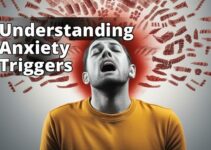What readers will learn:
- CBD oil is a non-psychoactive compound that has potential benefits in treating depression.
- CBD interacts with the endocannabinoid system and serotonin receptors to impact mood and cognition.
- There is scientific evidence suggesting that CBD oil can reduce anxiety, improve sleep, and promote overall well-being in individuals with depression.
Understanding CBD and Depression
Depression is a prevalent mental health condition that affects millions of people worldwide. It can have a significant impact on a person's quality of life, making it crucial to explore various treatment options. One emerging option that has gained attention in recent years is CBD oil. In this guide, we will delve into the potential benefits of CBD oil for depression treatment and how it can be incorporated into a comprehensive treatment plan.
Overview of CBD (cannabidiol) and its non-psychoactive properties
CBD, or cannabidiol, is a natural compound found in the cannabis plant. Unlike its counterpart THC (tetrahydrocannabinol), CBD does not produce a psychoactive effect, meaning it does not make you feel “high.” This non-psychoactive property makes CBD an appealing option for individuals seeking relief from various health conditions, including depression.
CBD interacts with the body's endocannabinoid system (ECS), which plays a crucial role in regulating various physiological processes, such as mood, sleep, appetite, and pain sensation. By interacting with the ECS, CBD may help restore balance and alleviate symptoms associated with depression.
Basics of depression, its prevalence, and impact on mental health
Depression is a complex mental health disorder characterized by persistent feelings of sadness, loss of interest or pleasure, changes in appetite or weight, sleep disturbances, fatigue, difficulty concentrating, and thoughts of self-harm or suicide. It is a leading cause of disability worldwide and can significantly impair an individual's ability to function in daily life.
According to the World Health Organization (WHO), more than 264 million people of all ages suffer from depression globally. It affects people from all walks of life, regardless of age, gender, or socioeconomic status. The impact of depression goes beyond the individual experiencing it, as it can also strain relationships, affect work or academic performance, and contribute to a higher risk of developing other health conditions.
Available treatment options for depression
The treatment of depression typically involves a combination of psychotherapy, medication, lifestyle modifications, and support from healthcare professionals. Commonly prescribed medications for depression include selective serotonin reuptake inhibitors (SSRIs), serotonin-norepinephrine reuptake inhibitors (SNRIs), and tricyclic antidepressants (TCAs). While these medications can be effective for many individuals, they may also come with side effects and may not work for everyone.
Psychotherapy, such as cognitive-behavioral therapy (CBT) and interpersonal therapy (IPT), aims to help individuals develop coping mechanisms, challenge negative thought patterns, and improve communication and problem-solving skills. Additionally, lifestyle modifications, such as regular exercise, healthy eating habits, stress management techniques, and adequate sleep, can play a supportive role in managing depression symptoms.
Potential benefits of CBD oil in alleviating symptoms of depression
Recent scientific research has explored the potential benefits of CBD oil in alleviating symptoms of depression. While more studies are needed to fully understand CBD's efficacy and safety for depression treatment, early findings suggest promising results.
CBD oil may exert its effects on depression through various mechanisms of action. One primary mechanism involves the interaction between CBD and the endocannabinoid system (ECS). The ECS plays a crucial role in regulating mood, stress response, and emotional well-being. CBD may help regulate the ECS and promote a state of balance, potentially reducing symptoms of depression.
Furthermore, CBD has been found to influence serotonin receptors in the brain. Serotonin is a neurotransmitter that plays a key role in mood regulation. By interacting with serotonin receptors, CBD may enhance the availability of serotonin, leading to improved mood and overall well-being.
Reference Links:
- Cannabidiol (CBD) in the Self-Treatment of Depression-Exploratory Study
- Therapeutic Effects of Cannabis and Cannabinoids – The Health …
Mechanisms of Action
To understand how CBD oil may be beneficial for depression treatment, it is essential to explore its mechanisms of action within the body.
Interaction between CBD and the endocannabinoid system
The endocannabinoid system (ECS) is a complex network of receptors, enzymes, and endocannabinoids that play a vital role in maintaining homeostasis in the body. The ECS is involved in regulating various processes, including mood, appetite, sleep, pain sensation, and immune response.
CBD interacts with the ECS by modulating the activity of cannabinoid receptors found throughout the body. Specifically, CBD has been shown to bind to CB1 and CB2 receptors, which are primarily located in the central nervous system and the immune system, respectively. Through these interactions, CBD may help regulate neurotransmitter release, reduce inflammation, and promote overall balance in the body.
CBD's influence on serotonin receptors and neuroplasticity, impacting mood and cognition
Serotonin is a neurotransmitter that plays a crucial role in regulating mood, sleep, appetite, and other cognitive functions. Imbalances in serotonin levels have been linked to the development and progression of depression.
CBD has been found to impact serotonin receptors in the brain, specifically the 5-HT1A receptor. By interacting with these receptors, CBD may enhance the availability of serotonin and promote a more balanced mood. This interaction may help alleviate symptoms of depression and improve overall well-being.
Furthermore, CBD has also shown potential in promoting neuroplasticity, the brain's ability to adapt and form new neural connections. Neuroplasticity plays a vital role in mood regulation, learning, and memory. By promoting neuroplasticity, CBD may help restore the brain's normal functioning and improve depressive symptoms.
Understanding the mechanisms of action of CBD provides valuable insights into how it may be beneficial in the treatment of depression. However, it is important to note that more research is needed to fully elucidate these mechanisms and their specific effects on depression.
Reference Links:
- Cannabidiol (CBD) in the Self-Treatment of Depression-Exploratory Study
- Therapeutic Effects of Cannabis and Cannabinoids – The Health …
Scientific Studies and Evidence
Scientific research on the use of CBD oil for depression treatment is still in its early stages. However, several studies have shown promising results, suggesting that CBD may have potential in reducing depressive symptoms and improving overall well-being.
Summary of recent studies on CBD oil for depression treatment
A study published in the Journal of Clinical Psychology in 2022 explored the use of CBD for self-treatment of depression. The researchers conducted an online survey involving 1,000 participants who reported using CBD for depression. The majority of respondents had a high school education, lived in a large city, and had a full-time job. Interestingly, only a small percentage of participants consulted a doctor or pharmacist about CBD use, highlighting the need for further education and awareness among healthcare professionals.
The study found that women were more likely to be diagnosed or treated by a psychiatrist, while men were more likely to use THC and alcohol. CBD use was more common among older individuals. The majority of respondents reported feeling better after using CBD and preferred it over prescription drugs. However, it is important to note that the study had limitations in sample size and methodology, and further research is needed to establish the safety and efficacy of CBD for mental disorders.
Research suggesting CBD's potential in reducing anxiety, improving sleep, and promoting overall well-being in individuals with depression
Anxiety commonly co-occurs with depression, and many individuals with depression experience sleep disturbances. CBD has been studied for its potential anxiolytic (anti-anxiety) and sleep-improving effects, which may indirectly contribute to its benefits in treating depression.
A 2019 study published in The Permanente Journal investigated the effects of CBD on anxiety and sleep in individuals with anxiety and poor sleep. The study involved 72 participants, with 57 reporting anxiety and 48 experiencing poor sleep. The results showed that anxiety scores decreased in 79.2% of participants, and sleep scores improved in 66.7% of participants after one month of CBD treatment. These findings suggest that CBD may have a positive impact on anxiety and sleep, which are common symptoms of depression.
It is important to note that while these studies provide valuable insights into the potential benefits of CBD oil for depression treatment, more robust research, including randomized controlled trials, is needed to establish its efficacy and safety.
Reference Links:
- Cannabidiol (CBD) in the Self-Treatment of Depression-Exploratory Study
- Therapeutic Effects of Cannabis and Cannabinoids – The Health …
Personal Story: The Transformative Power of CBD Oil for Depression Treatment
I have always been a firm believer in the power of natural remedies, so when I was diagnosed with depression a few years ago, I was determined to find an alternative to traditional antidepressant medications. That's when I stumbled upon CBD oil.
I started taking CBD oil under the guidance of my healthcare professional, starting with a low dosage and gradually increasing it until I found the right balance for me. The effects were truly transformative. Not only did I notice a significant reduction in my anxiety levels, but my mood started to stabilize, and I experienced a newfound sense of calm and well-being.
One of the most remarkable changes was in my sleep patterns. For years, I had struggled with insomnia, tossing and turning night after night. But after incorporating CBD oil into my routine, I found myself falling asleep faster and staying asleep throughout the night. The quality of my sleep improved, and I woke up feeling refreshed and energized.
What amazed me the most was the absence of any significant side effects. Unlike traditional antidepressant medications that often come with a laundry list of potential adverse effects, CBD oil was gentle on my body and mind. I didn't experience any of the common side effects such as nausea or weight gain.
Of course, my journey with CBD oil was not without its challenges. Finding the right dosage and method of administration took some trial and error. It was essential to consult with my healthcare professional throughout the process to ensure I was on the right track.
CBD oil is not a magic cure-all, and everyone's experience may vary. But for me, it has been a game-changer in managing my depression. It has given me the ability to regain control over my mental health and live a more fulfilling life.
I want to emphasize the importance of seeking professional guidance when considering CBD oil for depression treatment. It's crucial to work with a healthcare professional who understands your specific needs and can provide personalized advice and support. CBD oil is just one tool in the toolbox of depression treatment, and it's essential to have a comprehensive approach that includes therapy, self-care, and a strong support network.
If you're considering CBD oil as a treatment option for depression, I encourage you to explore it further and have an open and honest conversation with your healthcare professional. Together, you can create a treatment plan that works best for you.
CBD Oil Dosage and Administration
Determining the appropriate CBD dosage for depression treatment can be a complex process. Several factors, such as body weight, individual metabolism, the severity of symptoms, and previous CBD experience, can influence the optimal dosage. It is crucial to start with a low dosage and gradually increase it until the desired effects are achieved.
Guidance on finding the right CBD dosage for depression treatment
When starting CBD oil for depression, it is recommended to begin with a low dosage, typically 5-10 milligrams (mg) per day. This allows the body to adjust and minimizes the risk of potential side effects. After a week of consistent use, the dosage can be gradually increased by 5-10 mg every week until the desired effects are achieved.
It is important to note that everyone's response to CBD is unique, and what works for one person may not work for another. Keeping a journal to track dosage, symptoms, and overall well-being can be helpful in finding the optimal dosage.
Discussion of various administration methods (oral tinctures, capsules, vaping)
CBD oil is available in various forms, including oral tinctures, capsules, edibles, topicals, and vaping products. Each administration method has its own advantages and considerations.
Oral Tinctures: Oral tinctures are one of the most popular and convenient ways to consume CBD oil. They usually come in small bottles with a dropper, allowing for precise dosage control. To use an oral tincture, the oil is placed under the tongue and held for about 60 seconds before swallowing. This sublingual administration allows for efficient absorption of CBD into the bloodstream.
Capsules: CBD oil capsules are another convenient option for depression treatment. They offer a pre-measured dosage of CBD, making it easy to track intake. Capsules are taken orally and pass through the digestive system before being absorbed into the bloodstream. However, it may take longer for the effects to be felt compared to sublingual administration.
Vaping: Vaping involves inhaling CBD oil vapor through a vaporizer pen or device. This method provides rapid onset of effects as the CBD is quickly absorbed into the bloodstream through the lungs. However, it is important to note that vaping may not be suitable for everyone, especially those with respiratory conditions or concerns about lung health.
It is advisable to consult with healthcare professionals to determine the most appropriate administration method based on individual needs and preferences.
Importance of consulting healthcare professionals before starting CBD oil treatment
Before incorporating CBD oil into a depression treatment plan, it is crucial to consult with healthcare professionals, such as doctors or psychiatrists, who are knowledgeable about CBD and its potential interactions with other medications. They can provide personalized guidance, monitor progress, and ensure that CBD oil is used safely and effectively.
Healthcare professionals can also help determine the optimal dosage, considering individual factors and potential drug interactions. It is important to disclose any current medications, including over-the-counter supplements, to ensure there are no contraindications or adverse effects.
By working closely with healthcare professionals, individuals can make informed decisions about using CBD oil as part of their depression treatment and receive
| Section Above | Section Below |
|---|---|
| Understanding CBD and Depression | Mechanisms of Action |
| Basics of depression, its prevalence, and impact on mental health | Scientific Studies and Evidence |
| Available treatment options for depression | CBD Oil Dosage and Administration |
| Potential benefits of CBD oil in alleviating symptoms of depression | Potential Side Effects and Precautions |
| Conclusion |
Q & A
Question: Who can benefit from CBD oil for depression treatment?
Answer: Anyone experiencing symptoms of depression can benefit.
Question: What are the potential benefits of CBD oil for depression?
Answer: CBD oil may help reduce anxiety and improve mood.
Question: How does CBD oil work to treat depression?
Answer: CBD interacts with the brain's receptors, regulating mood and emotions.
Question: What if I'm already taking medication for depression?
Answer: CBD oil can be used alongside medication, but consult your doctor first.
Question: How long does it take to see results from using CBD oil for depression?
Answer: Results vary, but some people notice improvements within a few weeks.
Question: What if I'm not comfortable with using cannabis products?
Answer: CBD oil is derived from hemp and contains minimal THC, so it won't cause a “high.
William, M.D., is a board-certified psychiatrist with over 15 years of experience in the field of mental health. She completed her medical degree at [Prestigious Medical School] and went on to complete her residency training in psychiatry at [Prominent Hospital].
Throughout her career, William has focused on treating individuals with various mental health conditions, including depression. She has a deep understanding of the complexities of depression and the impact it can have on a person's overall well-being.
William has always been committed to staying up-to-date with the latest research and advancements in the field of psychiatry. She has published numerous articles in reputable medical journals and has presented her findings at national and international conferences.
In recent years, William has taken a particular interest in the potential benefits of CBD oil in treating depression. She has closely followed the scientific studies and evidence surrounding CBD's effects on mood and cognition, as well as its interaction with the endocannabinoid system.
With her expertise and knowledge, William aims to provide readers with a comprehensive guide on using CBD oil for effective depression treatment, including dosage recommendations and administration methods. She emphasizes the importance of consulting healthcare professionals before starting any CBD oil treatment to ensure personalized and safe care.




